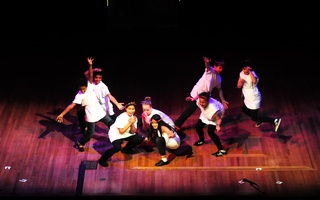During the spring and summer before I entered Harvard, my favorite activity was reading Edward Fiske's guide to colleges.
That's Edward B. Fiske of The New York times. Big-time education editor. Well-respected. He must know what he's talking about.
I just knew that somewhere, buried in the description of Harvard's inaccessible professors and overachieving students, was that pearl of wisdom which was going to get me through this place. Or at least put me on the right track.
Fiske was not an optimist about the chances of being happy at the most prestigious school in the country. "[I]t's not necessarily the best school for every bright high school graduate to attend," he wrote. His key piece of advice went something like this: Harvard can be a big and impersonal place. So the key is to find a niche, "a comfortable academic or extracurricular circle around which to build your life." Once you've got your spot and your group of friends, then you're all set, according to the Fiske Theory of Getting Through Harvard Alive.
Despite (or maybe because of) my many Fiske readings, I was in one of my quasi-rebellious phases come September. Fuck Fiske. Fuck The New York Times. Fuck The Establishment.
I decided not to follow his advice.
What was I going to do at Harvard, the land of opportunities? Maybe try for Phi Beta Kappa. Not. Or maybe try to become president of The Crimson. Too much work. Or maybe attain the esteemed title, King of the Comp.
The "comp" seemed like an evil concept before I arrived at Harvard. It was described in those Fiske-esque, ultimate-insider guides to college as the embodiment of typical Harvardian ruthlessness. Harvard: so high-powered, so many superstars, that there's not only cutthroat, steal-the-books-from-the-library-and-hide-them-und er-your-pillow competition in academics--but you've got to fight for your right to join extracurriculars as well. Scary stuff.
But once I got here, I found that the comp was the best part of Harvard life. The socalled "comp" etition was virtually nonexistent. If you want to join some organization and put in a little bit of time, then you almost always get into them (unless you try for some twisted, elitist, social clubs like the often unfunny Lampoon). You get to bum around doing whatever you like with minimal responsibility. No ruthless cuts. Harsh, extracurricular competition is one of the bigger myths at this place (beating out such whoppers as sex at Widener Library and oppressive political correctness).
You never know what you might gain from a comp--or one of the inevitable, pointless introductory meetings which precede each comp. These meetings are, on the surface, little more than a chance to put your name down on another list. But Masters of Introductory Meetings, who often become Kings of the Comp, find ways to get something out of these gatherings.
"So, what do you think of this meeting?" I asked the girl standing next to me at the Independent's intro meeting.
"Seems all right," she said.
That was the first of many deep, insightful conversations with my future girlfriend.
Comps let you meet people who share your interests, particularly upperclass students, who you might otherwise never meet: the administration, in its constant bowing to the altar of tradition, does its best to isolate first-years from the rest of the college.
"Don't go outside the gates of the Yard," a dean may tell you at one of those orientation meetings where they also tell you that cheating and plagiarism are generally bad things that are frowned upon by the University, "unless we put you in a Union dorm--in which case you can go to the Yard and the Union. But whatever you do, don't go down to the river. Save that privilege for next year."
Read more in News
GSAS Dean Finalist for Position at VirginiaRecommended Articles
-
1400 Attend Ball, But Have Trouble Getting HomeAlmost a quarter of Harvard's undergraduate population got in touch with their inner child on Saturday evening at the Children's
-
1992 CANDIDATES FOR HARVARD & RADCLIFFE CLASS MARSHALSBert Adams Winthrop House Crimson Key Society Marshal's Office Coordinator, Freshman Parents' Weekend Organizer; Harvard Sailing Team; Memorial Church Usher,
-
Harvard Troupe Visits Local SchoolsNext February, up to 125 students from Cambridge schools will join a troupe of Harvard performers in Sanders Theater to
-
 CityStep Selling Good Luck Grams During Reading Period
CityStep Selling Good Luck Grams During Reading Period -
 Nina M. Yancy
Nina M. Yancy -
 At 30 Years, CityStep Flashes Back in Annual Performance
At 30 Years, CityStep Flashes Back in Annual Performance













